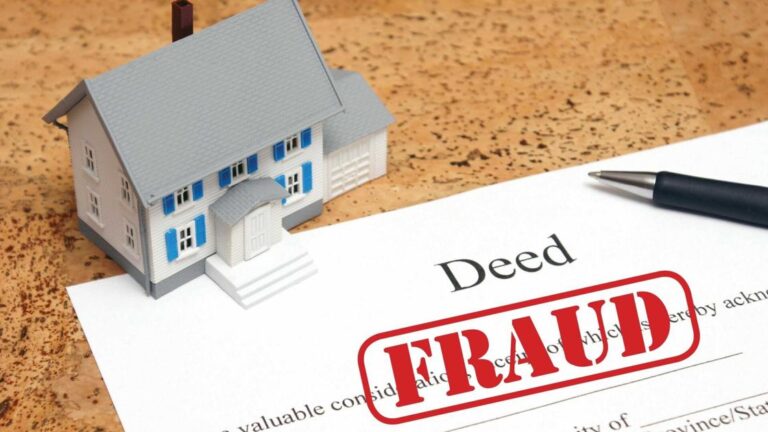Homeownership is a significant financial milestone that represents years of hard work and dedication. However, this valuable asset can also make you a target for unscrupulous individuals seeking to exploit your hard-earned investment. Deed theft scams, also known as home title fraud, are a growing concern among homeowners, involving the illegal transfer of property ownership without the knowledge or consent of the rightful owner.
Understanding Deed Theft Scams
Deed theft, commonly referred to as home title fraud, is a growing concern among homeowners, involving the illegal transfer of property ownership without the knowledge or consent of the rightful owner. These schemes often target unsuspecting individuals who may not be aware of the potential risks associated with their property ownership.
What is Deed Theft?
Deed theft is a serious crime in which a scammer illegally obtains a property deed and uses it to transfer ownership of the property to themselves or another person. This can happen in a variety of ways, including forgery, deception, and impersonation.
How Does Deed Theft Happen?
Scammers often use social engineering techniques to trick homeowners into giving them access to their property records or signing documents that they do not understand. They may also use phishing scams or dumpster diving to obtain personal information that they can use to commit fraud.
The Devastating Impact of Deed Theft
Deed theft, also known as home title fraud, is a serious crime that can have devastating consequences for homeowners. When scammers steal a property deed, they are essentially taking away the rightful owner’s ownership rights and transferring them to themselves. This can lead to a number of problems for the homeowner, including:
- Loss of the home: If the scammer is able to successfully transfer ownership of the property, they may be able to sell the home or rent it out without the homeowner’s consent. This could leave the homeowner homeless and without any legal recourse.
- Legal battles: Homeowners who are victims of deed theft may have to spend a lot of time and money fighting in court to get their home back. This can be a long and difficult process, and it is not always successful.
- Financial hardship: The legal costs associated with fighting deed theft can be significant. In addition, homeowners may also lose out on equity in their homes if they are unable to sell or refinance their property.
- Stress and anxiety: The stress and anxiety of being a victim of deed theft can be overwhelming. Homeowners may feel scared, angry, and helpless. This can lead to physical and emotional health problems.
In some cases, deed theft can even lead to violence. Scammers who are desperate to protect their ill-gotten gains may become violent if they feel threatened.
Common Deed Theft Techniques
Deed theft, also known as home title fraud, is a serious crime that can devastate homeowners. Scammers use various tactics to steal property deeds, often targeting unsuspecting homeowners and gaining access to their personal information. Here are ten common deed theft techniques that homeowners should be aware of:
1. Social Engineering
Scammers often pose as representatives of legitimate organizations, such as banks, government agencies, or title companies, to gain the homeowner’s trust. They may call, email, or text the homeowner, claiming to need their signature to refinance a mortgage, clear property taxes, or resolve title issues. These scammers may be persistent and persuasive, trying to pressure the homeowner into acting quickly.
2. Phishing
Scammers may send emails or text messages containing links to fake websites or attachments. When clicked, these links can install malware on the homeowner’s computer or steal personal information, including their social security number, bank account information, and property deed details.
3. Dumpster Diving
Scammers may search through trash or recycling bins to find personal documents, including tax records, property tax bills, or insurance statements. These documents can be used to identify potential targets and gather information for deed theft schemes.
4. Mail Theft
Scammers may steal mail containing property deeds, mortgage documents, or other sensitive paperwork. They can then use these documents to impersonate the homeowner and file fraudulent deeds with the county recorder’s office.
5. Forged Documents
Scammers may forge the homeowner’s signature on a deed, transferring ownership of the property to themselves or a fictitious person. They may then file the forged deed with the county recorder’s office, making it appear as if the deed has been legally transferred.
6. False Liens
Scammers may file false liens against the homeowner’s property, claiming they are owed money for unpaid services or repairs. These liens can make it difficult for the homeowner to sell or refinance their property.
7. Unauthorized Construction
Scammers may start construction on the homeowner’s property without their permission, using the construction as leverage to force the homeowner to sign away their property rights.
8. Unscrupulous Brokers or Agents
In some cases, unscrupulous real estate brokers or agents may be involved in deed theft schemes. They may forge the homeowner’s signature on a deed or use their influence to pressure the homeowner into signing over the property.
9. Inheritance Scams
Scammers may contact the homeowner, claiming they are a distant relative or heir to a large inheritance. To claim the inheritance, the homeowner may be asked to provide personal information or sign documents that grant the scammer power of attorney.
10. Impersonation of Government Officials
Scammers may impersonate government officials, such as tax assessors or sheriff’s deputies, to intimidate the homeowner into signing over their property. They may claim that the homeowner owes back taxes or has a warrant out for their arrest.
Protecting Yourself from Deed Theft Scams
Deed theft, commonly known as home title fraud, is a growing concern among homeowners, involving the illegal transfer of property ownership without the knowledge or consent of the rightful owner. These schemes often target unsuspecting individuals who may not be aware of the potential risks associated with their property ownership.
Steps to Protect Yourself From Deed Theft Scams:
1. Secure your property records:
- Keep your property title, mortgage documents, and other sensitive paperwork in a secure location, preferably a fireproof safe.
- Do not leave property records lying around in your home where they could be easily accessed by others.
- Shred any documents containing personal information or property details before disposing of them.
2. Be aware of phishing scams:
- Be wary of emails or text messages that request personal information or ask you to click on links.
- Never click on links or open attachments from unknown senders.
- If you receive a suspicious email or text message, contact the sender directly to verify their authenticity.
3. Check your property records regularly:
- Request copies of your property records from the county recorder’s office periodically to ensure there are no unauthorized changes.
- Monitor your credit report regularly to identify any suspicious activity, such as new credit accounts or inquiries.
4. Never give out personal information over the phone:
- Be wary of callers who ask for personal information, such as your social security number or bank account details.
- If you receive a call from someone claiming to be from a legitimate organization, ask for their name, contact information, and the reason for their call.
- Do not provide any personal information until you have verified the caller’s authenticity.
5. Report suspicious activity immediately:
- If you suspect that you have been a victim of deed theft, contact the police immediately.
- You should also contact your local title company or real estate attorney for assistance.
Organizations Where You Can Report Deed Theft Scams:
- Federal Trade Commission (FTC): https://reportfraud.ftc.gov/
- National Association of Realtors (NAR): https://www.paymints.io/2021/04/how-to-report-real-estate-fraud/
- American Land Title Association (ALTA): https://www.alta.org/business-operations/operations/mortgage-fraud-prevention
Additional Precautions:
- Review your homeowners insurance:
- Ensure your homeowners insurance policy covers losses related to fraudulent title transfers.
- Consider adding title insurance to your policy for additional protection.
- Create a durable power of attorney:
- A durable power of attorney allows you to appoint someone to act on your behalf in case of incapacitation or incapacity.
- This can help to prevent someone from taking advantage of you if you are unable to protect your own interests.
By following these steps and taking the necessary precautions, you can help to protect yourself from deed theft scams and safeguard your valuable asset.


















